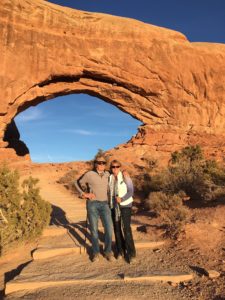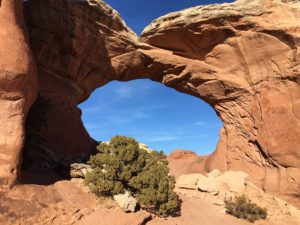Our stories / your stories matter.
On day 7 of our 14-day tour of National and State Parks in Arizona and Utah, my husband, Michael, and I enjoyed Arches National Park, in Moab, Utah. In the guide to the park, they highlighted that each of the 2000 arches catalogued has its own lifespan, timespan and story. None will be here forever. As they captured the stories of the arches, the authors encouraged:
that each of the 2000 arches catalogued has its own lifespan, timespan and story. None will be here forever. As they captured the stories of the arches, the authors encouraged:
“As you look at each arch, think of its timescale compared to your own. What tests of time mark your greatest chapters of change? What will be left as a testimony to your story?”
It was exciting to walk from one rock formation to another, marvel at the majesty and behold its breath-taking beauty in the present moment. And it was awe-inspiring to walk among them with the wisdom of those who have made it their life’s work to inform us. I marveled at the beauty of our environments and the ingenuity of the men and women who navigated them and called them home.
We can make more informed choices.
By years of study and astute observation, scientists of all kinds have documented the creative and destructive processes the defined these places. They keep finding engaging ways to connect us to the wisdom and stories of their subjects. Whether for our enjoyment and edification or to communicate our role in what is happening in our ever-evolving eco-system, they are calling us forth. As we know more about how our actions impact these environments, we can make more informed choices about how to interact with and in them…and with one another.
These stewards and students of our environment are offering us a sacred experience and an opportunity to join them. They are inviting us to become active observers and engaged participants in our collective, unfolding story. And they are masterfully modeling the way.
Witnessing serves a sacred function.
In his memoir, Memories, Dreams and Reflections, Carl G. Jung told a story of one of his first trips to Africa, something few people from western developed societies had done at that time. Marveling at things he and most people had never imagined nor seen before, he noted that bearing witness to it all made it known. Witnessing serves a sacred function. Feeling like a stranger in a strange land, as if in a waking dream, he reflected on the importance of self- and other-witnessing. He noted that, to bear witness to ourselves and one another is to honor that we exist. It is in the witnessing that we make it so. As we articulate what we are observing, we speak it into existence.
During the Day of the Dead ceremonies we celebrate every year on All Soul’s Eve and throughout the first days of November, we do the same thing. It is said that, by remembering our dearly departed, they will not be doomed to remain in limbo, a kind of purgatory. In remembering them, they are never really gone. They can move on because they are always with us.
We can celebrate and learn from our experiences.
Walking through these parks, in, around and under these arches, and through a landscape that is in constant motion, is an act of witnessing. With the help of early explorers and selfless scientists, I got to peer deeper into the lives of ancient environments, eco-systems and our earlier ancestors. Because of them, I will remember everything I’ve seen and experienced during this trip. As I share my learning through language and images, I become an extension of them, a steward, a student and a celebrant.
Being in the environment has the impact of reminding us of our place in the eco-system, and how each of us can serve it or harm it. What is possible when we support each other to peacefully co-exist? Each of us has a choice.
In vast environments such as our national parks, it is easy to feel utterly insignificant in the grand scheme of things. Simultaneously, each of us is utterly significant. If I take just one step off of a marked trail, that simple act could substantively change a habitat for decades or generations to come. Both are true. We are all an active and powerful part of the beautiful unfolding that is this life. Our choices matter as do our lives and stories.
 We can show up consistently and powerfully, no matter what life brings.
We can show up consistently and powerfully, no matter what life brings.
Like the arches that will eventually disappear thanks to the presence of water, freeze and thaw cycles, wind and gravity, we, will return to dust and be forgotten. Until then, we get to live, love and experience life. And we can be good stewards and students, making decisions that matter. Ideally, we will choose to engage, participate and show up, consistently and powerfully, no matter what life brings. That is a form of leadership too. I call it self-leadership.
As we brought our seventh day of travel to an end and marked the middle of our 14-day adventure, Michael and I paused under the light of the full moon to reflect. Quietly, we celebrated the rocks. We celebrated the sacred function of witnessing. And we celebrated his new ruby red Ford F-150 truck, our really cool backpacks and photos, walking sticks and hikes. We took time to hold hands and lean in for a kiss, to miss our children and count our blessings. We imagined tent camping and then laughed that idea off as something from times gone by. It’s true, we are older now. In light of our ages, we make different choices than we once did, with full permission. We take less strenuous hikes, eat in nice restaurants, and enjoy hot showers at the end of the day.
Whatever stage of life you are in, I would encourage you to travel, to pause, to bear witness to your life and the life unfolding around you. See yourself as a part of the eco-system. Then tell your stories to someone who will honor you by listening. Once you do, you might loosen your grip on them a little or let them go altogether. Allow yourself to be present to what and who is right in front of you, now. It’s deeply empowering and a lovely gift to give another.
Take time to remember and be grateful, to pause, travel and touch a tree.
During your travels, whether through our country’s national Parks, the world, your family’s history, or your own backyard, take time to bear witness to your own life and the life going on around you. Touch a tree and take time to listen to the birds. Feel the sand and soil on your bare feet, the sun and wind on your exposed cheeks. Hear the voices arising from within, wanting your attention. Make space to sense, remember and feel.
In the process of pausing, ask yourself, “What will be left as a testimony to your story?” Consider, “What tests of time mark your greatest chapters of change? What tests are coming? And, what wants your attention, devotion and witnessing, right now?”
Perhaps that’s enough — the sacred act of consciously witnessing and being witnessed? May it be so.





